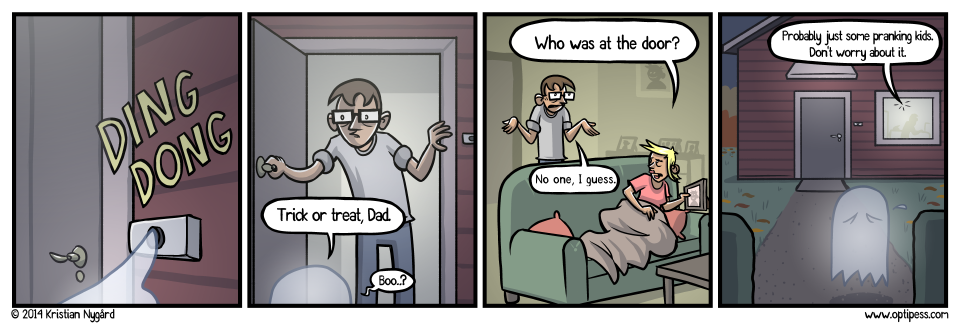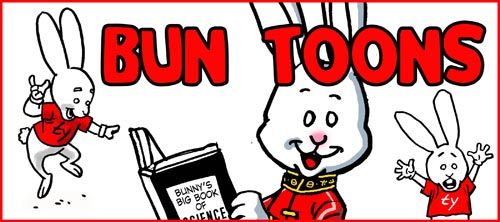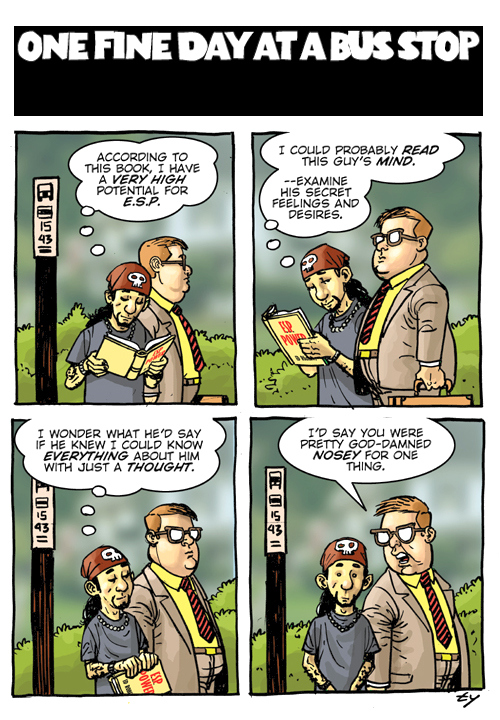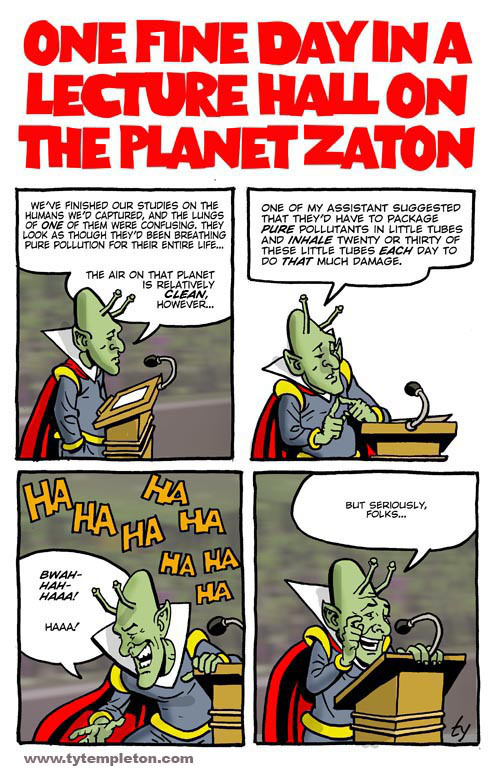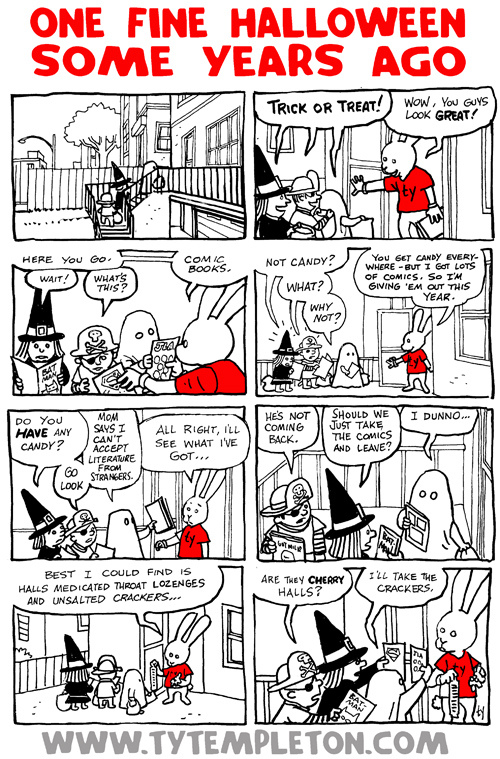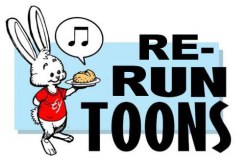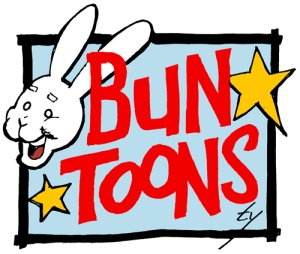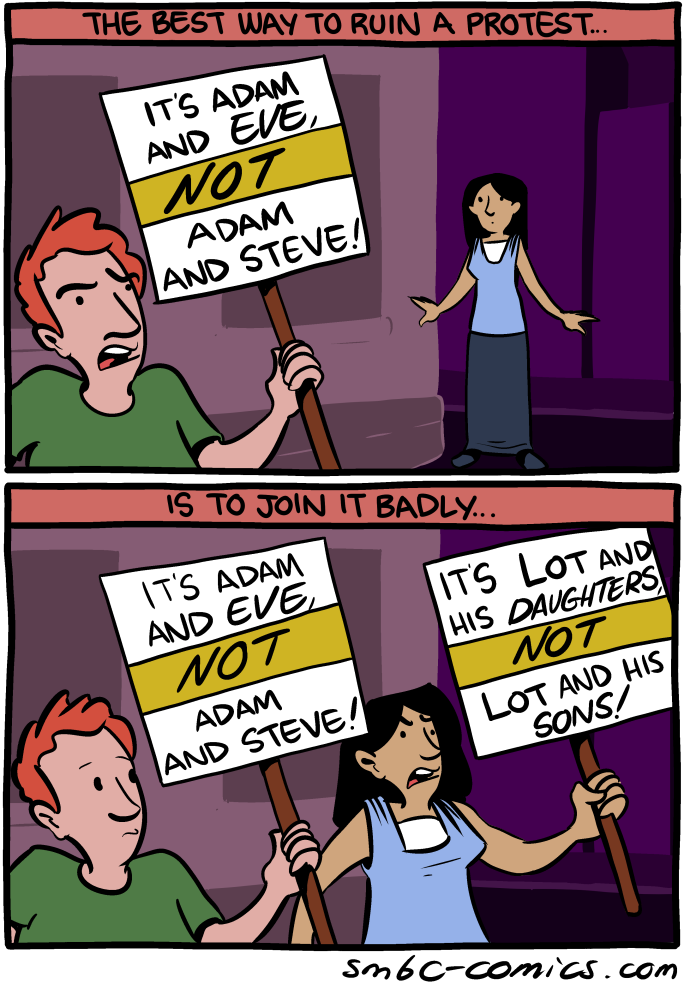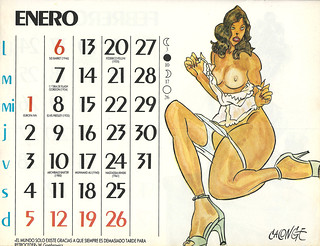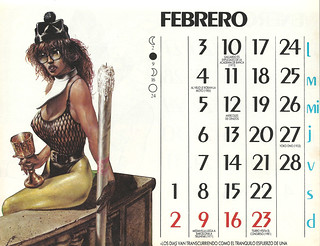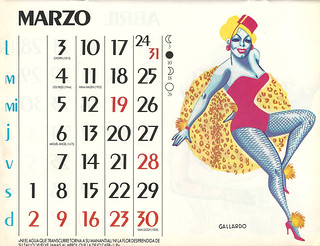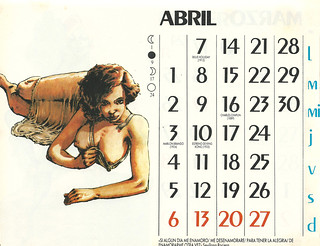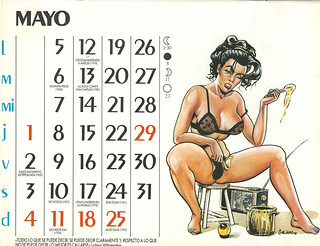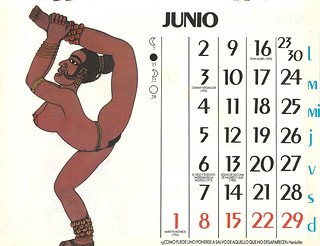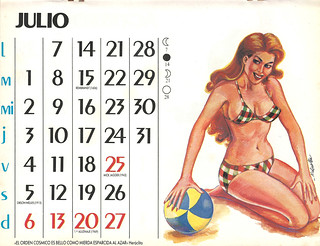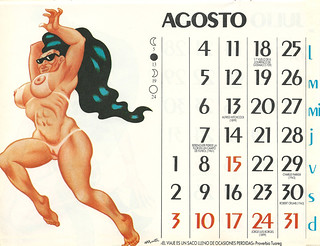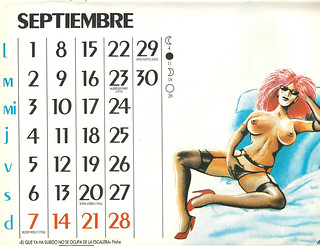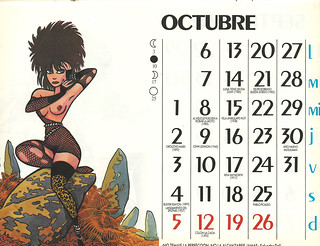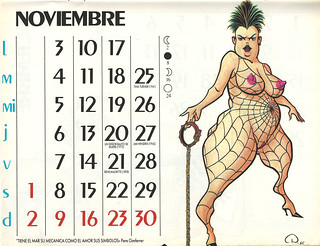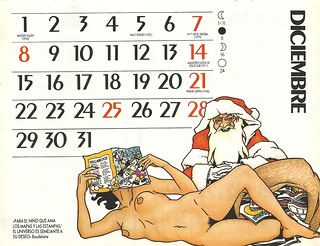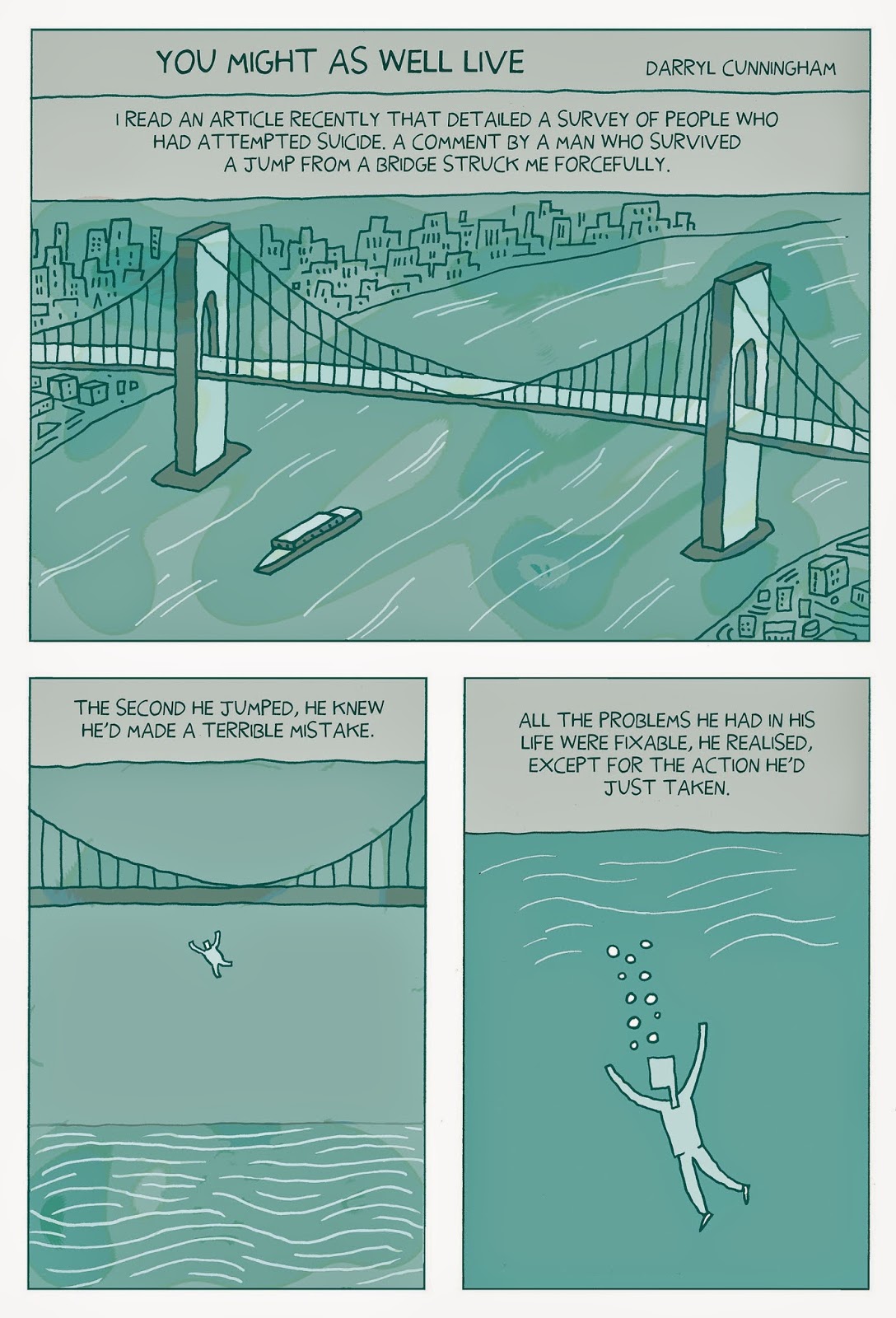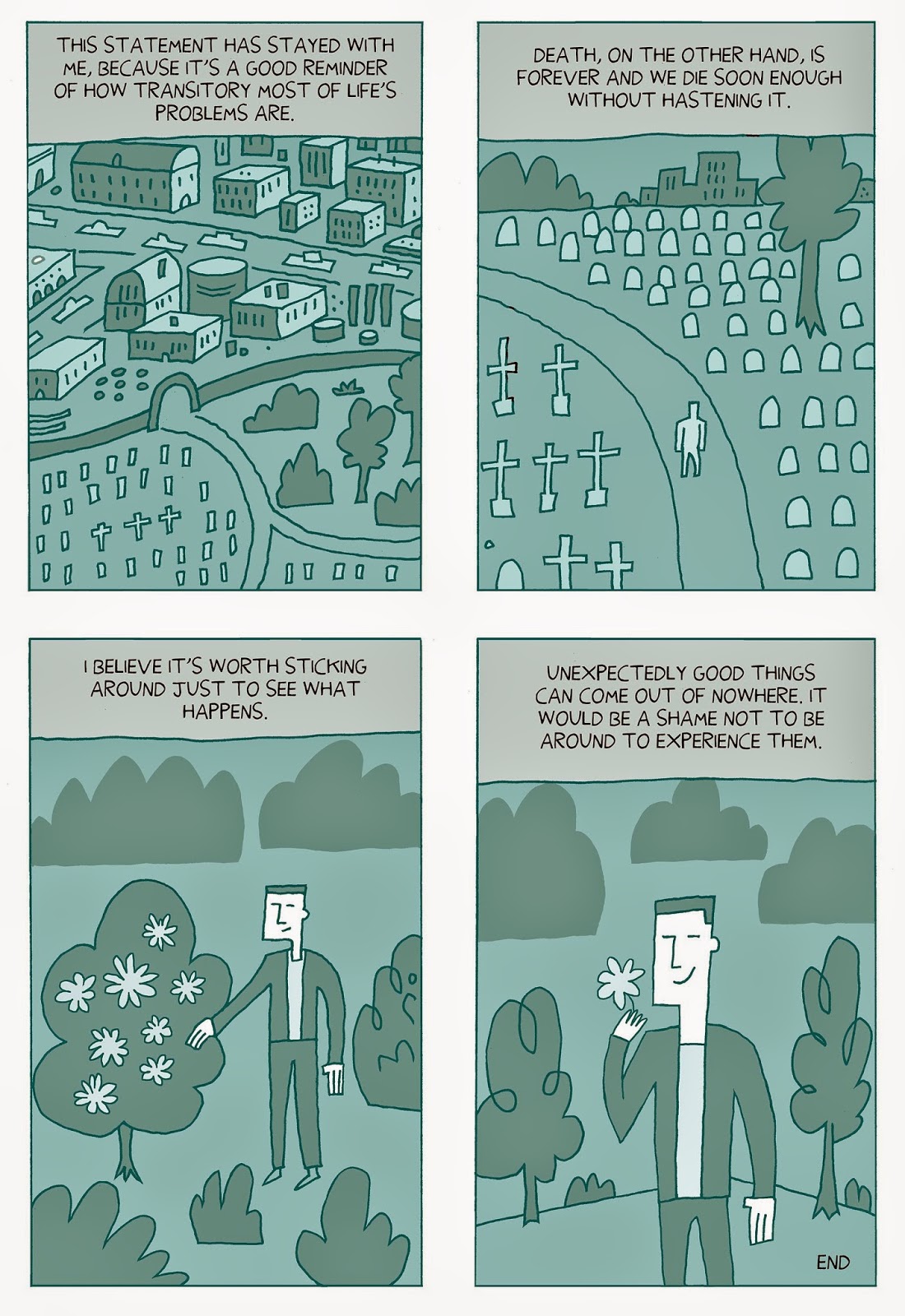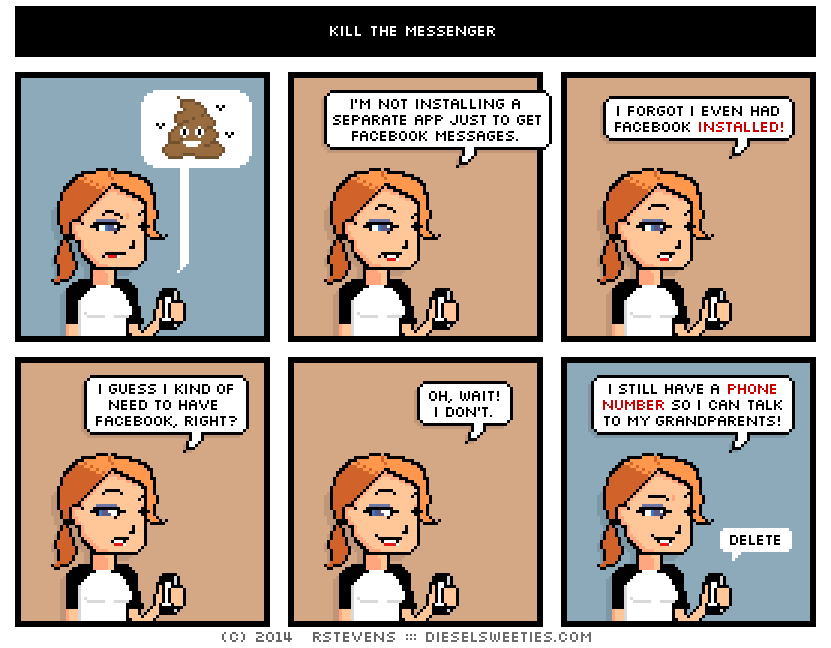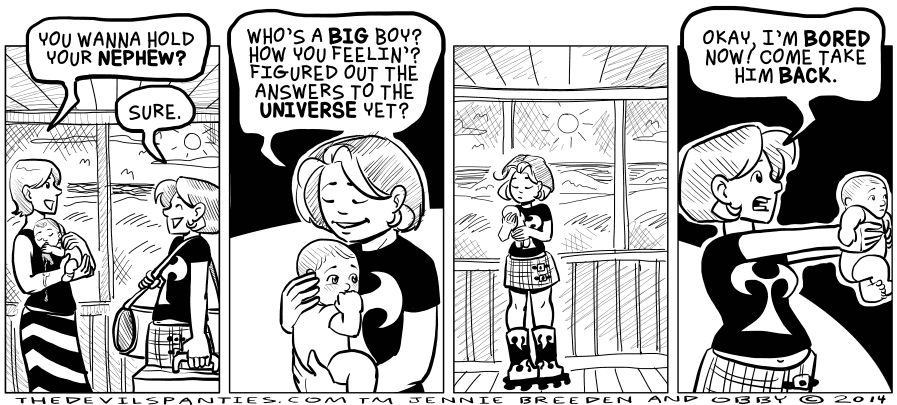Unhappy Halloween, everyone! Check out even more of my Halloween comics here – some of them might even be slightly more uplifting.
Shared posts
10/29/14 PHD comic: 'Not write'
| Piled Higher & Deeper by Jorge Cham |
www.phdcomics.com
|
|
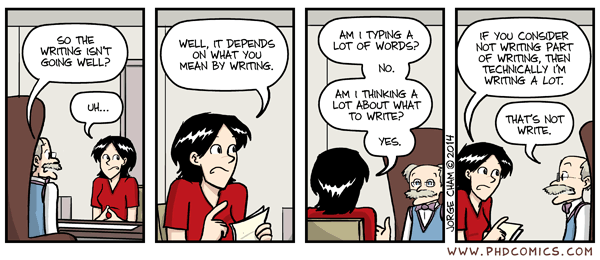 |
||
|
title:
"Not write" - originally published
10/29/2014
For the latest news in PHD Comics, CLICK HERE! |
||
One Fine Set of Bun Toons! YAY!
There’s no escaping it. The dreaded DEADLINE DOOM is still with us (though it will be over in a matter of days). That means I STILL cannot spare even eight minutes this weekend, without making it impossible to make my Monday deadlines.
Since it’s such a fine day, I thought today I would re-run all my Bun Toons that start with the phrase, “One Fine Day….”. I did a lot of those in the early years of the Bun Toon, firstly because it was an homage to Don Martin, but mostly because it meant I didn’t have to have continuing characters, or a point of view, or my own comedic voice.
These are a few of my favorites of the “ONE FINE DAY…” Bun Toons.
Is there anything as timeless as an Adam Lambert reference?
My kids have pointed out to me how very odd it would be to have a young person reading a book. It should have been a Kindle. Live and learn.
It’s funny because cancer.
I shall be back next week with an ALL-NEW BUN TOON, I promise. Unless there’s some sort of natural disaster or the Earth opens up.
Ty the Guy OUT!
AND as your Bonus ONE FINE DAY…I even have one about Halloween, which is coming up, so it SEEMS timely.
This last one is actually true, by the way….so it’s also an HONEST TO GOD TRUE LIFE ADVENTURE….another series within Bun Toons, I shall save for some future deadline doom.
———————————————————————————————
True Stuff: The Art of Letter Writing
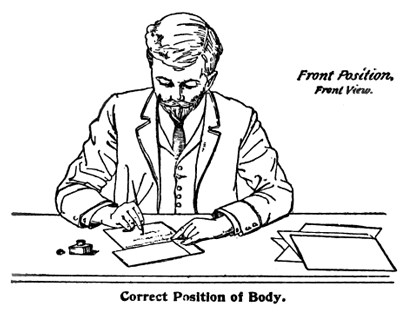
Every now and then you see someone talking about “the lost art of letter writing.” There was a TED talk, and a book last year, and there always seem to be articles and thinkpieces aplenty:
Thomas G. Knoles, the Marcus A. McCorison Librarian at the American Antiquarian Society, has an intimate knowledge of the more than 100,000 handwritten letters, as well as 1,500 manuscript collections, spanning from 1630 to present day, that are housed in the society’s archives.
“Life was so different in the 19th century. People didn’t have television, computers or radios, any of the distractions that they have now,” Knoles said. “Between the fact that it was the only way of communicating with people who were local and the fact there was actually disposable time to write the letters, letter writing was something that was a common practice.”
…While he feels the transition to the computer is a natural one, Knoles said there will be a whole texture of what everyday life was like that is going to be much harder to recapture because people don’t keep letters like they do emails and texts.
“We can grieve for anything that changes, but my own feeling is that you have to accept the fact that things are going to change,” Knoles said. “People grieved when the typewriter came. People grieved in the mid-19th century when the envelope was introduced and before that they used sealing wax.”
– “Mass. Scholars Mourn Lost Art Of Letter Writing”, CBS Boston, March 22, 2014
To be clear, I am a fan of letter writing!
• As the quote above says, letter writing, its other charms aside, preserves history. On this site I’ve discussed correspondence by the Wright Brothers and shown off letters my mother received from Isaac Asimov. My mother, a prolific correspondent, has saved bushels of letters we’ve come across decades later, but in the future, we are likely to find few from the era since she began sending emails.
• A couple years ago, I sent letters — 521 of them — to every head of state in the world, every governor in the U.S., 200 of the world’s top CEOs, and the pope. I got 52 letters back!
• People send me letters! I love it when they do. Here’s one I got recently (click for bigger):
…Of late, however, we faced a quandary regarding your fine publication. Sharp-eyed old Grisby noticed there is a price cited on your mast-head. Imagine our shame at discovering we have been leeches, sucking the bounty of your blood for close to eleven years, without so much as lying about paying…
Enclosed please find the requisite payment of six pence… Notices of subscription renewals should not be sent and will go unanswered. We consider the matter closed.

• Hundreds of people sent us letters about Machine of Death — we asked them to, in exchange for us sending them a death prediction card in the mail. We said “send us anything,” and the results were amazing.
So, I’m firmly on the side of writing letters. But it’s true that it’s somewhat of an affectation these days. I correspond with people all the time, but the last letter I wrote was an angry one to the IRS.
One of my favorite historical books, though, is all about writing letters…
The Formality of Letters
Before the creation of special envelopes, letters were usually folded over and sealed with wax. But this was somewhat less than secure, as this 1840 article about the invention of an early mass-produced envelope explains:
Among other consequences that have grown out of the new postage system, is the universal employment of envelopes, which have now become almost essential to all polite or official correspondence.
A writer in a late number of the Quarterly Review, alluding to the employment of envelopes, observes they “are very popular, particularly with the higher and middle classes, because it is the fashion, and a mark of bon ton [high society] to enclose one’s letter in an envelope.
A scheme, therefore, that enables all to indulge in this little aristocratic convenience, is pretty generally acceptable…
(Emphasis mine.)
Early envelopes had poorly-gummed flaps that could easily be opened, or wax seals and wheat-paste stickers (“wafers”) that could be pried off and re-adhered, allowing for the potential of tampering but also the loss of privacy: “the injury which has been occasioned by family secrets transpiring in this manner is of the most distressing kind; much worse, in fact, than the consequences of fraud and dishonesty”.
The “Hermetic Envelope” pictured above proposed to solve this by doing away with wax, and instead using the postage stamp to seal the envelope. This also served a dual purpose: when the recipient opened the envelope by tearing the stamp, that destruction served to cancel (or “frank”) the stamp, meaning the letter did not need be franked at the post office and could be delivered more quickly.
1833’s The Gentleman and Lady’s Book of Politeness and Propriety of Deportment (the shortest title of any book published that year) (I imagine) describes a few of the most important elements of courteous letter-writing:
…To write on very coarse paper, is allowable only to the most indigent; to use gilt edged and perfumed paper for letters of business, would be ridiculous. The selection of paper ought always to be in keeping with the person, the age, the sex, and the circumstances of the correspondents.
Ornamented paper, of which we have just spoken; paper bordered with colored vignettes and embossed with ornaments in relief upon the edges; and paper slightly colored with delicate shades, are designed for young ladies and those whose condition, taste, and dignity, presuppose habits of luxury and elegance…
It is extremely impolite to write a letter upon a single leaf of paper…It should be always double, even though we write only two or three lines. It is still more vulgar to use for an envelope, paper on which there are one or two words foreign to the letter itself, whether they be written or printed…
A folded letter, especially if written upon vellum paper, should be pressed at the folds by means of a paper-folder…
Every letter to a superior ought to be folded in an envelope. It shows a want of respect to seal with a wafer; we must use sealing-wax. Men usually select red; but young ladies use gilt, rose, and other colors. Both use black wax when they are in mourning.
Except in this last case, the color is immaterial, but not the size, for very large ones are in bad taste. The smaller and more glossy, the better ton [fashion] they are…We should not seal a letter of respect with an antique device. It is more polite to use our coat of arms or a cipher.
The chapter goes on at great length, describing the proper forms of address when writing to a king. As you do.
But all of those little rules and courtesies are but nonsense on a dreamscape compared to the following instructional book, a favorite from my own collection: The New Century Standard Letter-Writer (1900).

How To Write Good
The Gentleman and Lady’s Book of Politeness, the previous book I quoted from, leads off its correspondence section with the disclaimer “Our readers have too much judgment to think that we wish to give them lessons in style, or teach them how they should write letters of friendship, of congratulation, of condolence, of apology, of recommendations, of invitation, of complaint, or of censure. This enumeration alone, shows the impossibility of it.”
But that is exactly what The New Century Standard Letter-Writer does. It’s a collection of example letters, for people to use as templates or structural models when writing any of the letters one might need to over the course of…one’s whole life, I guess?
For the Letter-Writer is phenomenally comprehensive. Starting with the simplest business letters:

To more delicate matters of courtesy that may arise in the office:

To the uncommon, but all the more needing of example for that reason, notice required when a widow must announce the death of her husband to his late employers:

And on through progressively more intimate matters — such as personal but formal business:

This last letter shows precisely why I like this book: it very readily lends itself to imagining the personal dramas occurring behind the pages. In fact, it could work cover-to-cover as a novel, a piece of fiction telling the story of a people strictly through the letters they write.
Like the best novels, of course, it becomes progressively more dramatic as the pages turn, and the stakes grow ever higher. In the prior selection, we glimpsed trouble at the tailor shop; now, here comes a very forward request from a lady asking if she can live on a stranger’s farm:

It’s wonderful. It’s the beginning of a BBC film, or something.
In this one, a son explains to his father how much he has come to dislike his job (which presumably, his father helped place him in):

I must remind you that this is not a book of story prompts, it is an etiquette book about letter writing. It’s very easy to forget.
The drama increases as this pleasant Christmas letter veers into a complaint:

I honestly don’t know if these examples are reprints of actual letters, though I imagine not, if they’re supposed to function somewhat as templates (and many of the later ones include several possible responses, depending on the desired affect).
But it’s in the regarding of these as templates that it’s so strange to see the letter “To a Mother from Her Daughter after First Day in College” (Example 119) go on for three solid pages of the writer meeting roommates, and experiencing miscommunications about lodging, and feeling homesick — followed by an “Answer to the Above” from the mother, reassuring the daughter, talking about the baby at home, and noting that “Gertrude has been to the house to inquire what we have heard from you.”
These personal details, presumably invented by the book’s author, are what make these letters so peculiar. And it gets stranger as the templates dive into the fraught world of:

The very first example — “From a Gentleman to a Young Lady Friend of His about a Misunderstanding” — is followed by three possible answers: one “Kindly”, one “Conciliatory”, and one “Chilly”: “I think that my manner toward my friends and acquaintances usually represents me correctly. Truth to one’s self will not always allow absolute uniformity in one’s outward action. I think a further exchange of explanations will not be profitable.”
Re-read that. “I think a further exchange of explanations will not be profitable.” Use it in your daily life. It’s solid.
Oh, the raw emotions on display in these letters, and of course their responses that are crushed, or furious, or elated, as the reader desires! It would take the length of the book to reprint everything that I find wonderful about it all.
But here are a few of the many template letters the book provides for the romantically inclined in various situations, along with a few sample sentences:
From A Gentleman Asking Permission of a Lady to Address Her by Her Christian Name — “I feel almost ready to apologize for the length of my last letter. It seemed as if I couldn’t make you understand my friend Gunther’s difficulties without the dull details of the particular circumstances. I thank you for the consideration you gave the matter. He is trying your plan.”
Marriage Proposal to a Lady to whom the Writer has never been Introduced — “I know only too well that I am taking a very unusual step in venturing to address you, but let me trust that under the circumstances you will be inclined to excuse it, as unfortunately there appears to be no other course open to me of making myself known…Kindly accept my enclosed photograph. Dare I hope that it may silently speak for me?”
Marriage Proposal from a Gentleman of Small Means — “Do you think you could be happy as the wife of a poor man?…Although I am not in a position to maintain a wife at the present time, my prospects are encouraging, as my uncle has promised to take me into partnership early next year, which will materially improve my position.”
Answer to the Above (Unfavorable) — “My father will not for a moment hear of our engagement, and whatever my own feelings may be, you would not, I am sure, wish me to disobey him…Dear Mr. Redfield, good-bye, forgive me for the disappointment I am compelled to inflict, [and] think of me kindly.”
Marriage Proposal to a Young Lady, from a Widower with Grown-up Daughters — “In spite of my being well over forty, my sympathies and affections are as keen as if I were twenty years younger…You would be a sister and companion to my girls, and to myself the most beloved of wives.”
From a Father to a Gentleman who has paid Marked Attentions to His Daughter Requesting to Know His Intentions — “I cannot allow her happiness to be trifled with; therefore hope that you will see the propriety of at once putting an end to a position embarrassing to her as it is painful to me.”
Answer to the Above — “Under these circumstances, I conclude you would wish me to discontinue my visits at your house and I shall do so with much regret.”
From a Gentleman to his Fiancée — “It is nine o’clock, and I am just home from the office. You see I am working hard…I was thinking only of you all the time — you in your little pink gingham under the apple tree. Do you remember? It was May, and the sun was setting, and I kissed you for the first time without being scolded for it. You are not sorry that you didn’t scold me? Think hard, dear, and tell me when you write.”
Answer to the Above — “The snow is twenty inches deep, and we are almost buried. Jim brought me your letter this morning. He was quite exhausted ploughing his way up to the house. ‘Thought it would pay me, Polly,’ he said, ‘to see the love-light in your eyes.’ Dear, lonely old Jim, so faithful and unselfish! Mother brought him in and gave him a cup of coffee.”
Remember: THIS IS A BOOK OF TEMPLATES
At this point in our story, love has seemingly conquered. But the letters now begin to take a turn…
From a Gentleman to his Fiancée, Complaining of Her Coldness — “At the party last night you appeared to prefer every man in the room to myself as partner. If you acted in this way with the idea of arousing my jealousy, let me tell you it is very dangerous game to play at.”
From a Lady to her Fiancé, Complaining of His Indifference — “I feel you are very much changed, your manner to me at times almost amounting to indifference. Your letters are short and cold, and but few words of affection can be extracted from them.”
From a Lady to her Fiancé of Whom She is Jealous — “My Dear Charles: — May I hope that you will not think me foolishly exacting if I say that you have pained and hurt me by the attentions you so constantly offer to Mrs. Dunstable?”
Answer to the Above (Protesting) — “I must tell you, once and for all, that I detest jealousy in a woman, and should soon cease to care for one who tormented me by repetition of such accusations…I can see nothing but wretchedness ahead if you persist in giving way to this feeling.”
From the Mother of a Young Lady to Her Daughter’s Fiancé, Concerning a Quarrel Between the Lovers — “I well know how delicate a matter it is for a third person to interfere with lovers’ quarrels, but as the happiness of my daughter is at stake, it is my duty as her mother to try and bring about a reconciliation between you.”
From a Lady to Her Fiancé Breaking off Their Engagement on Account of His Coldness — “You will not feel surprised at the contents of this letter…I could not be happy with one whom I did not esteem as well as love, and by your conduct of late you have forfeited my good opinion, and have destroyed my faith in you. Your letters are herewith returned and I beg that you will send mine back; kindly acknowledge also receipt of the presents you have made me at different times.”

There are so many more. Invitations to a garden party; an older man attempting to offer a girl a present; how to postpone a friend’s visit on account of illness in the family; how to address the President or members of Congress.
One each of everything you will likely need to write, your whole life long.
The Lost Art of Letter-Writing
And so! In this entire book full of letters, emotions rent from souls and plastered onto paper, is this the art we have forgotten, the apogee of the form? Is this the point to which we must look, when we consider all that we have lost?
Or…
It would seem as though letter-writing, which half a century ago was a luxury and a delight, is about to become a lost art, a mere memory of days of happy leisure.
WHAT.
Even in 1900, it was already gone.
But did it die, or was it killed? What, in 1900, was actively destroying the once-great art of letter-writing?
That infernal device: the TYPEWRITER.
But the world moves on! The days of leisure are passed; and a busier age demands quicker methods. In answer to this demand the writing-machines have appeared…Yet, as long as the world lasts letter writing will hold an important place; indeed, it will always be a part of our best life. Business even will sometimes assume such importance, and involve so many intricate details, that it will seem that nothing short of a long and carefully written letter, in which the individuality of the writer appears in the character of his hand-writing, will fully serve the purpose of the occasion.
…Type-written letters are more or less all alike, they have no individuality, are marked by no personal characteristics; while, on the other hand, no two letters from the pens of different writers are ever alike…In more intimate intercourse, the hand-written letter still reigns supreme. The mother does not want a machine-written letter from her son. Type-written letters might be from some other son to some other mother. She wants to see her son’s handwriting, for to her loving eyes, his angular, awkward, and even misspelt, letters are a thousand times more beautiful and symmetrical than any letter any typewriter ever produced.
What ardent lover would care to receive a type-written letter? Do not lovers fondly linger, and dote, and dream over the very characters wrought by the hand they love so well? A letter from a lover’s hand is a revelation that no machine-written letter can ever be. Besides all this, are there not dottings of i’s and crossings of t’s, and countless twists, and turns, and underlinings, all full to the brim of mystic meanings that no typewriter on earth could convey?
There are other things, moreover, that it would show very poor taste to commit to the typewriter. Such, for example, as letters of condolence or congratulation. No thoughtful, cultured person would send a letter of condolence to a mother who had lost a child, or a letter of congratulation on a wedding anniversary, written on a machine! It would be as far from good taste as though sent from a printing office in printed form.
Who would have cared to have received type-written letters from the brave boys who were fighting the battles of freedom thirty years ago? What treasures those letters were! Written from the battle-fields, on scraps of paper, with the drum head for a desk. Written in haste while “the foe was suddenly firing”; crumpled, blotted, and sometimes stained with blood. How the mothers and sweethearts kissed the precious missives, and even sturdy fathers were not ashamed of tears! The straggling, imperfect penmanship was beautiful, seen by the eyes of love.
While love and tenderness endure, love letters and letters sent home must be written by the hand, for there is often as much impressiveness in the form of a letter as in the accents of the voice. In short, good and careful letter-writing will always form an important element in a liberal education. A gentleman is nowhere so much a gentleman as in his letters.
Man. I’m never using a typewriter again.
Previously:
- True Stuff: The Ethics of Retouching
- True Stuff: Idealized vs. Realistic Portraiture
- True Stuff: Socrates vs. the Written Word
- True Stuff: The Menace of Telephones
This is exactly how I feel…
… reading some of the comments in the last weeks. (Click on the image for a larger version.)
Reyn wrote: [...] I think that this comic is pretty disrespectful. Even without the jump from furries to bdsm, I think it is unacceptable to portray the bdsm community but completely disregard the practice of conversation and mutual agreement that is a very important part of such a relationship. [...]
Seriously, wat??
Dark Science #34 - Wait
Hey guys! I’ve just started a Patreon to help support the comic and expand what I can do with it. If you don’t know, Patreon is a monthly donation system that has project benchmarks, sort of like a Kickstarter. I’m offering lots of rewards and that sort of thing, but the ultimate goal (via hiring a helper to handle my non-drawing work) is to have a regular Dresden Codak update schedule for the first time ever! If regular updates is something you’re into, check out what I’m offering over there, because I think this is finally something achievable!
Sorry for the radio silence for so long. I’d been kind of not dealing with anxiety and depression for the better part of a year, and it reached a breaking point last month. I’m doing well now, but all this has necessitated a limited use of the internet for a while. For the next few months I won’t be available much through social media, so if you need to contact me, please email me at dresdencodak@gmail.com. If you don’t follow me on Twitter or Tumblr, you won’t notice any difference, as I’ll still be updating the comic as always! I’ll also be posting sketches and little content updates on the Patreon blog.
Thanks so much for your patience and support. I couldn’t ask for a better readership, you guys really are the best there ever could be.
Girls with Slingshots - GWS #1897
Today's News:
I wound up killing a lot of time on Twitter and Facebook asking people to share their grammatical pet peeves to use in today's strips. Jesus, that recevied more opinions and reactions than most of my cat videos do! Did you hear me? MORE THAN CAT VIDEOS
Anyway, most people had the common you're/your and they're/there/their gripes, plus some it's/its thrown in here and there. I could spend all day telling you how much "everyday" vs. "every day" bugs me even more, or how I think that the made-up word "alot" is a better mistake than TOTALLY misuing the word "allot," but I'm a full-time cartoonist, not a full-time grammarian, and let's face it, since I started to be vocal about my grammar pet peeves years ago, I've been humbled (read: embarrassed) by people who know WAY more about grammar than I do over the past few years.
So instead, I'll just casually drop in these wonderful links for you guys to read at your leisure. It's Friday, after all; like your boss is really paying attention to what you're doing at work. Besides, it's good for your language health! I hope you're wearing business casual.
Grammar Girl (aka Mignon Fogarty) will always be my hearthrob. Here's a little ditty about the word "alot," which is still not nearly as bad as misusing "allot," in my opinion.
Here's how Grammar Girl feels about do's and don'ts. (For the record, I agree.)
Ever wonder why spell it "whoa" instead of "woah"?
Or maybe you wondered about the difference between yay, yea, and yeah? (Scroll down, search for the words, and hit "Read.")
My earlier snarl regarding the word "everyday" versus "every day" is explained here, along with other compound words. (I'm a fan of using words like "alright," "altogether," and "already," for the record.) If you serve breakfast every day, like EVERY FUCKIN DAY, use two words. If breakfast is an everyday occurance (in that "everyday" describes the occurance), use it as one word.
An overview of compound nouns (beware the audio ads, sorry!).
I didn't listen to all of this podcast, but it seems like something us condescending part-time sometimes-wrong grammar nuts should listen to.
And, of course, my favorite argument for the Oxford comma, starring JFK and Stalin as strippers. (Credit: AEFERG Illustration.)
For the record, I think the Oxford comma should be used the same way we use apostrophes with an s for plural nouns: only when it's necessary to make clear our intentions.
Funny enough, humans created language so that we can all communicate our ideas clearly to one another. So it's okay to be a human and make your own decisions when you use your language, so long as you're being careful to use it in a way that communicates your ideas clearly to others.
That said, I hold the unpopular opinion that if you say "I could care less" SARCASTICALLY, knowing that you mean the opposite... it's okay. Just make sure you're very clear in meaning "like, as if I could care less." Say it in a valley girl voice; everyone should get what you mean.
I know I'm gonna get some hate for that.
Y'all is and will always be an acceptable word in my book, so long as you know where to put the apostrophe. (Y'all is short for "you all." Do not write it "ya'll.")
You can use "y'all" to define one person if you'd like to make them feel really important. Use "all y'all" if you're talking to more than four of us.
Intentional misuse of the word "literally" is funny to me when used as an obvious hyperbole (Brian Filon, this one's for you). Just make sure you know the difference between "literally" and "figuratively." The former means FOR ACTUAL REAL SERIOUS. The latter means "I'm saying this for yuks."
I love semicolons; I think you should all learn how to use them. Let them fall between two full, complete sentences that relate well to each other.
And finally, yes, this video is dorky, fine, but it doesn't stop me from fully enjoying it. (Thanks, @GrammarRumble!)
09/15/14 PHD comic: 'Statistics!'
| Piled Higher & Deeper by Jorge Cham |
www.phdcomics.com
|
|
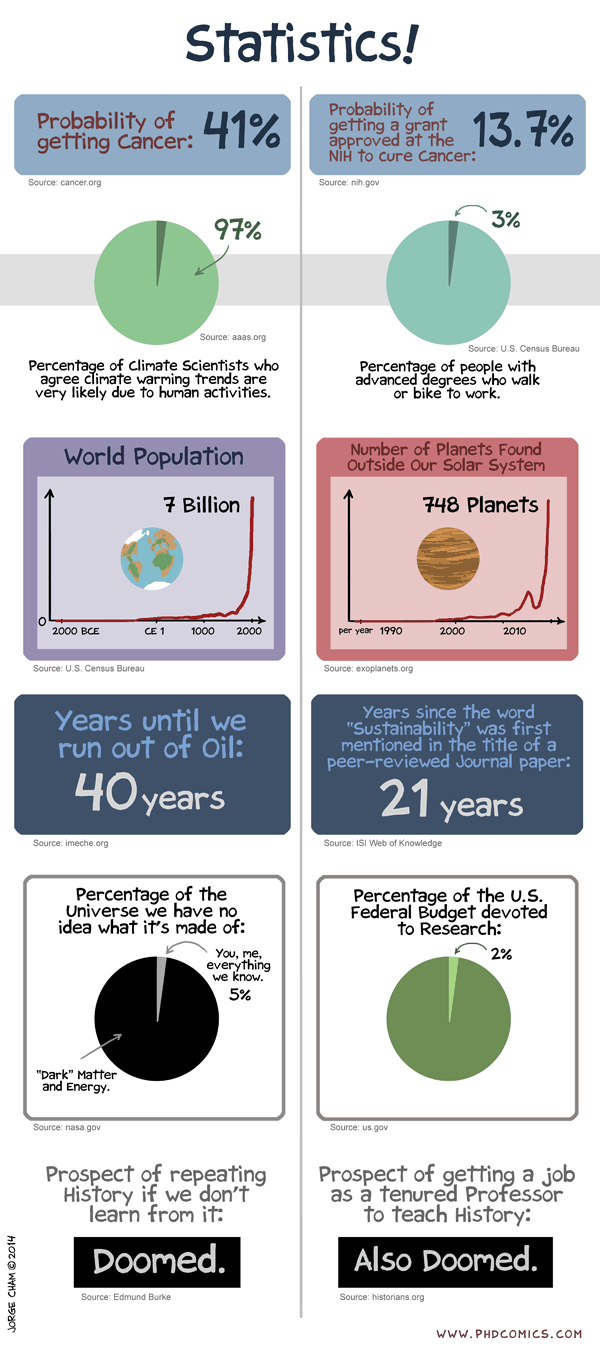 |
||
|
title:
"Statistics!" - originally published
9/15/2014
For the latest news in PHD Comics, CLICK HERE! |
||
Calendario Pin-Up, Revista El Víbora, Año 1986 (Solo Para Adultos, NSFW)
Deambulando por los antros de corotos caraqueños este fin de semana, me topé con este ejemplar de la legendaria revista Española El Víbora del mes de Diciembre del año ’85, aparte de su atractivo como artefacto retro me llamo la atención por dos cosas, la magnífica portada con RanX de Liberatore y el letrerito de “Calendario Pinup“.
Efectivamente, en las páginas centrales, se encuentra un calendario para lo que sería el año siguiente, 1986, con una variedad de pin-ups de diversos autores, por las firmas he podido identificar a algunos junto a su autor (haciendo click en las imágenes puedes acceder a la versión lulú en resolución de 300 dpi):
ENERO: Antoni Calonge
FEBRERO: Tanino Liberatore
MARZO: Miguel Gallardo
ABRIL: Pepe Boada
MAYO: Jose Luis Galiano
JUNIO: Ernesto Carratalá
JULIO: Juan Mediavilla
AGOSTO: Marti Riera
SEPTIEMBRE: Alfredo Pons
OCTUBRE: Max
NOVIEMBRE: Damián Carulla
DICIEMBRE: Roger
Si alguien se conoce al resto de los autores, pueden dejar la info en los comments, vacilen.
August 24, 2014

Ooh, neat. We got earthquaked.
#1053; The Star So Softly Said Hello
157. AMY POEHLER: Great people do things before they’re ready
Amy Poehler is one of my favourite funny people, known for her portrayal as Pawnee’s Leslie Knope in Parks and Recreation, which I’m a big fan of. She’s also a Saturday Night Live alum and co-founded the influential improv school, The Upright Citizens Brigade Theatre.
Besides being an incredibly talented and hilarious performer, Poehler has started projects to promote women’s rights and empower young girls. Her website Amy Poehler’s Smart Girls is a hub for young women to learn and be part of a community, and in her YouTube series Ask Amy, Poehler gives advice and answers questions from fans.
This quote is taken from an Ask Amy video about courage.
RELATED COMICS: John Green Make Gifts for People. Brené Brown The Woman in the Arena. Terence McKenna Nature Loves Courage. Ira Glass Advice for Beginners. Maya Angelou Phenomenal Woman.
- Thanks to Elise, professional blogger and crafty person, for introducing me to this quote. She used it in her World Domination Summit talk.
– I wrote a wrap-up of my recent USA trip, including how my own WDS speech went.
top 5 BuzzFeed posts of the week.
• 10 smart copywriting tips from the homeless.
• 10 more billboards greatly improved by graffiti.
• More of the best/worst local business taglines.
• And: the smartest strip club sign ever.
The Naked Brand

Corporations have an incredible influence on the world we live in, and that's given them free reign to pollute, collude and mislead us, but advances in technology are rapidly making them accountable not just to shareholders, but to everyone. We have constant access to the truth about the products we use and the ethics of the companies behind them, and big brands are realizing that looking great isn't enough. It's time to actually be great. The Naked Brand is a story about how corporations can help save the planet one small step at a time. It's an introduction to a bright new future where companies tell the truth and work hard to create better products and a better planet. That’s how I met Alex Bogusky. As the founder of Common, one of his chief initiatives is to implement a comprehensive sense of corporate transparency. In fact, his team at Common broadcasts their board meetings live online, so their customers can follow their discussions point by point, and hopefully turn complaints and customer suggestions into a conversation. Alex was an inspiration throughout the entire production process, and you can find out more about the film and Alex’s goal at Common by visiting www.thenakedbrand.com.
One of my favorite examples of transparency in The Naked Brand is Patagonia. They’ve taken a completely innovative approach to transparency, and it’s paying off big-time. On their homepage, they advocate their beloved Common Threads Initiative, a campaign that strongly urges consumers to buy less and reuse their clothing, promoting responsible, sustainable business. In addition, they’ve introduced The Footprint Chronicles, which itemizes the production process of every Patagonia item, providing customers with a clear view of their product and the effect its production has on the environment. In 2011 they even ran an ad in the New York Times that said “Don’t Buy This Jacket”, demonstrating their passionate commitment to environmental sustainability.
The Naked Brand emphasizes three benefits of running a sustainable, transparent business like Patagonia. First, it offers an immense benefit to the health of our planet, the one all of us share and love so dearly. Second, it provides customers with a more honest representation of corporate America and thus creates an opportunity to make better products that accurately reflect the customer. Third, and most importantly, sustainable and transparent business is hugely profitable. Consumers today have access to tons of information, and corporations are no exception. Customers cannot be fooled anymore, so it’s time to be great. The best businesses – those that are honest to consumers, responsible for the planet and relentlessly transparent – will be rewarded with happy customers and tons and tons of money. And ultimately, businesses like that will most certainly make the world a much better place.
Jeff Rosenblum, www.thenakedbrand.com follow me on twitter @JRQuestus / www.questus.com
